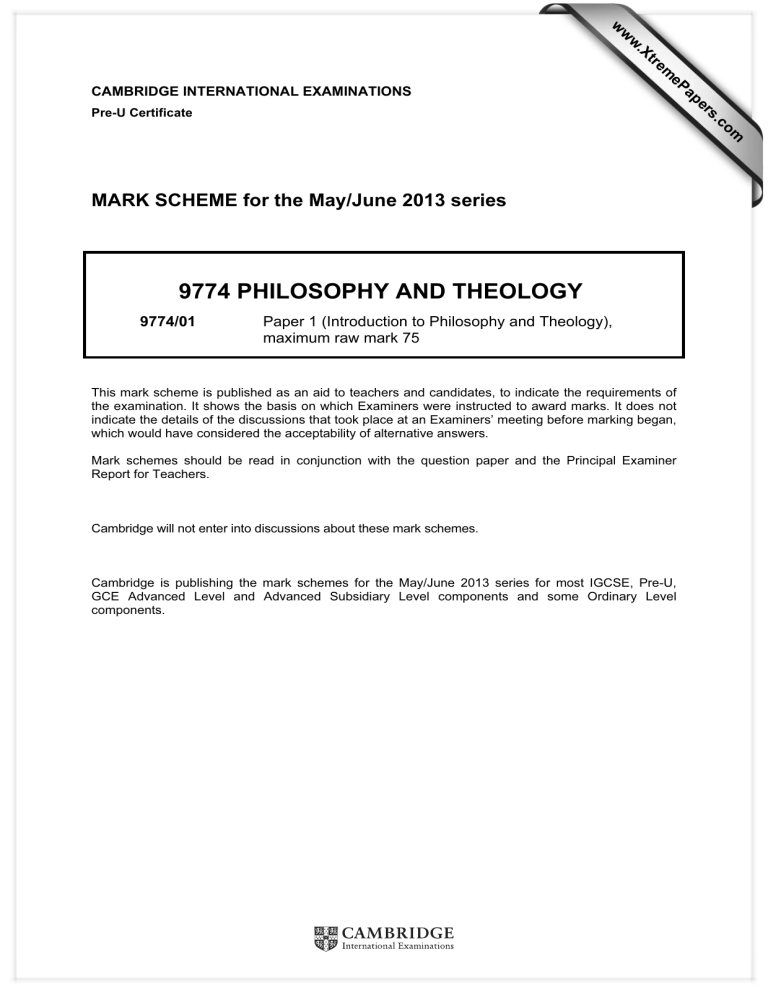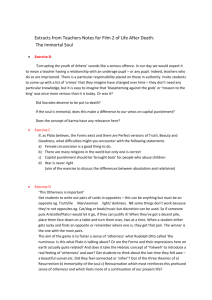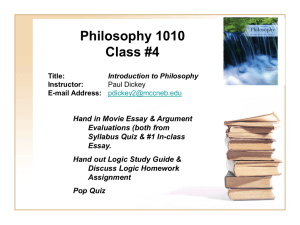9774 PHILOSOPHY AND THEOLOGY MARK SCHEME for the May/June 2013 series

www.XtremePapers.com
CAMBRIDGE INTERNATIONAL EXAMINATIONS
Pre-U Certificate
MARK SCHEME for the May/June 2013 series
9774 PHILOSOPHY AND THEOLOGY
9774/01
Paper 1 (Introduction to Philosophy and Theology), maximum raw mark 75
This mark scheme is published as an aid to teachers and candidates, to indicate the requirements of the examination. It shows the basis on which Examiners were instructed to award marks. It does not indicate the details of the discussions that took place at an Examiners’ meeting before marking began, which would have considered the acceptability of alternative answers.
Mark schemes should be read in conjunction with the question paper and the Principal Examiner
Report for Teachers.
Cambridge will not enter into discussions about these mark schemes.
Cambridge is publishing the mark schemes for the May/June 2013 series for most IGCSE, Pre-U,
GCE Advanced Level and Advanced Subsidiary Level components and some Ordinary Level components.
Page 2 Mark Scheme Syllabus Paper
relationship.
Pre-U – May/June 2013 9774 01
1 Critically examine Plato’s concept of the nature of body and soul and their inter-
[25]
Plato believed reality to be a combination of the empirical and the metaphysical, so his concept of the body-soul relationship reflects this in that humans have a dual nature – the physical body and the metaphysical soul. The soul is the intellectual and moral personality, is divine, immortal in its own right, and returns at death to its rightful home in the world of Forms, being subsequently reincarnated. The soul is reminded of the Forms by perceiving, through the body’s senses, those particular things in this world which participate in the Forms: this is Plato’s doctrine of anamnesis /recollection. The soul has a tripartite structure: reason/thumos/appetite, analogous to the tripartite nature of the state. Candidates might argue with Plato’s view that soul is needed to move everything that is not soul. His love of tripartite structures seems artificial. The evidence for the existence of a metaphysical soul is currently regarded as weak and lacking explanatory power. On the other hand, metaphysical ideas have many defenders and defences.
2 ‘The view that all knowledge starts with the mind claims too much.’ Discuss. [25]
The rationalist claim is that knowledge is a priori , prior to sense experience and innate. We know, for example (on the rationalist thesis) that events have causes, objects have extension in space, and we exist in time. Rationalists insist that the content of our concepts or knowledge goes beyond what the information provided by sense experience can provide, and they construct accounts of how reason in some way provides additional information about the world. Candidates might discuss the rationalist thesis in connection with philosophers such as Descartes and
Leibniz. The contrasting view is generally associated with Aristotelian empiricism, where knowledge is gained inductively – a thesis associated particularly with the work of philosophers such as Locke, Berkeley and Hume, particularly with Locke’s view that the mind begins as a tabula rasa and acquires knowledge exclusively through the senses. Empiricists aim to show how experience accounts for the privileged information claimed by rationalists. Some might argue that some knowledge starts with the mind, e.g. self-awareness / differentiation, but most knowledge comes from sense experience. Other balances between rationalism and empiricism might be offered in the analysis of “too much”.
3 ‘Fideism is inferior to rationalism.’ Evaluate this view of the nature of religious belief.
[25]
Fideist claims to a superior understanding of the basis of religious belief rest on the supposed impossibility of providing a rational foundation for belief. The rationalist view that there are foundational beliefs is challenged by sceptical arguments on the one hand and by faith-based approaches on the other. The fideist claims that faith is meritorious, and is underpinned by an attitude of commitment that is determined precisely by a lack of sufficient evidence. This might be illustrated by fideistic approaches from the likes of Plantinga, Alston, Otto, Kierkegaard, et al
. The view that fideism is inferior to rationalism in understanding religious belief is based largely on the vacuous nature of faith without evidence, since some faith stances are irrational and require the abandonment of scientific truth. Candidates might defend fideism on the basis that (e.g.
Christian) life is based on a free commitment to God, whereas faith based on rational presuppositions is not faith at all, but is a rationally compelled response.
4 Critically assess the claim that neither Augustine nor Aquinas offers a reasonable explanation of the nature and source of the conscience. [25]
The Augustinian view of the conscience sees conscience as innate, aided by God’s grace, and motivated by the love of God, with the proviso that the conscience must operate through being
© Cambridge International Examinations 2013
Page 3 Mark Scheme
Pre-U – May/June 2013
Syllabus
9774
Paper
01 informed (e.g. by Church rules). This might be illustrated in a recent context through the ideas of
J.H. Newman. The Augustinian view might be held to be incoherent on a number of counts, for example in so far as it appears to justify immoral acts and opinions simply on the view that their occurrence in the mind is sufficient testimony to their having been put there by God. Moreover morally good acts can be done only by following God’s moral commands, which entails the odd conclusion that those who have never heard God’s commands cannot be held morally accountable. Aquinas argued that what is innate is not God’s voice but the God-given faculty of reason aided by the synderesis rule of doing what is good and avoiding what is evil. Aquinas avoids one of the problems of Augustine’s view, in that he avoids falling foul of the Euthyphro
Dilemma in so far as God is not (in Aquinas’ view) a moral agent; nevertheless the dependence of Aquinas’ view on his theory of natural law is difficult for those who reject natural law, and even more difficult for those who reject any link between the conscience and a supernatural agent.
© Cambridge International Examinations 2013






